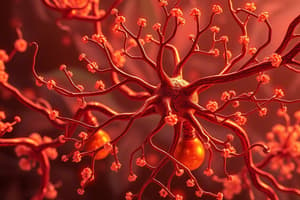Podcast
Questions and Answers
What is a primary characteristic of Myasthenia Gravis?
What is a primary characteristic of Myasthenia Gravis?
- Constant muscle weakness regardless of activity
- Worsening muscle strength with activity (correct)
- Muscle strength improves with continuous activity
- Instant recovery of muscle strength after exertion
What is the role of acetylcholinesterase inhibitors in the treatment of Myasthenia Gravis?
What is the role of acetylcholinesterase inhibitors in the treatment of Myasthenia Gravis?
- To decrease the production of acetylcholine
- To increase the available acetylcholine at the neuromuscular junction (correct)
- To block the immune response against muscle fibers
- To enhance muscle contraction directly
Which symptom is most commonly associated with the onset of Myasthenia Gravis?
Which symptom is most commonly associated with the onset of Myasthenia Gravis?
- Difficulty swallowing
- Complete paralysis of limbs
- Droopy eyelids (ptosis) (correct)
- Severe muscle cramps
Which tests are commonly used to diagnose Myasthenia Gravis?
Which tests are commonly used to diagnose Myasthenia Gravis?
What is a common autoimmune feature associated with Myasthenia Gravis?
What is a common autoimmune feature associated with Myasthenia Gravis?
What is the potential surgical intervention for patients with Myasthenia Gravis, particularly those with thymoma?
What is the potential surgical intervention for patients with Myasthenia Gravis, particularly those with thymoma?
Which statement correctly describes the relationship between Myasthenia Gravis and the thymus gland?
Which statement correctly describes the relationship between Myasthenia Gravis and the thymus gland?
What is a common finding in nerve conduction tests for diagnosing Myasthenia Gravis?
What is a common finding in nerve conduction tests for diagnosing Myasthenia Gravis?
Flashcards are hidden until you start studying
Study Notes
Neuromuscular Junction Diseases
- Neuromuscular junction diseases impact the site where nerves and muscles connect, crucial for muscle contraction.
- Myasthenia Gravis (MG) is a notable autoimmune disease impacting this junction, characterized by muscle weakness.
Myasthenia Gravis (MG) Overview
- Primarily affects women, demonstrating a significant gender disparity.
- Autoantibodies primarily target acetylcholine receptors on muscle cells, disrupting normal signaling.
Symptoms of Myasthenia Gravis
- Muscle weakness intensifies with physical activity and improves with rest.
- Common initial symptoms include:
- Droopy eyelids (ptosis)
- Double vision (diplopia)
- Can also affect bulbar muscles leading to difficulties in:
- Speech
- Chewing
- Swallowing
Causes of Myasthenia Gravis
- Often associated with abnormalities of the thymus gland, such as hyperplasia or the presence of a thymoma.
Diagnosis of Myasthenia Gravis
- Diagnosis involves:
- Nerve conduction studies
- Single fiber EMG to assess muscle response
- Key findings include:
- Decremental response in nerve conduction studies
- Increased jitter observed in EMG tests
Treatment Options for Myasthenia Gravis
- Medications:
- Acetylcholinesterase inhibitors (e.g., pyridostigmine) augment acetylcholine availability at the neuromuscular junction.
- Immunosuppressants:
- Steroids, azathioprine, or methotrexate address the autoimmune component.
- Other Therapies:
- Intravenous immunoglobulin (IVIG) and plasmapheresis utilized in severe cases or crisis situations.
- Surgical Intervention:
- Thymectomy, or removal of the thymus, is considered, especially in patients with thymoma.
Studying That Suits You
Use AI to generate personalized quizzes and flashcards to suit your learning preferences.



